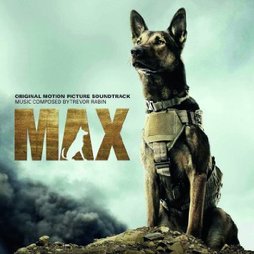
The film reunites Boaz Yakin with composer Trevor Rabin, whose last collaboration with the director was 2000's Remember the Titans. On that project, Rabin replaced veteran sports composer (and stylistic chameleon) John Debney, and delivered one of his most compelling scores to date. Best known for his work on Jerry Bruckheimer films, the choice of replacement was a no-brainer at the time, as Rabin was at the peak of his popularity in the late 90's. To me, Rabin's music is the pinnacle of guilty pleasure fare, the notables including Con Air, Armageddon, Deep Blue Sea, National Treasure and The Guardian. Each of these were uncomplicated, entertaining endeavors that, when contrasted, reveal that the composer's style has evolved very little since he came on the scene in the late 90's.
Of all of these scores, Max reminds most of National Treasure due to its reliance on patriotic bombast and frenetic, plucky Newman-isms ("Library of Congress" in that score, "Tracking Emilio" and "Let's Do This" in this one). Assembled with what seems to be a predominantly synthetic orchestral palette, the score is a largely monothematic endeavor. "Max's Suite" features that theme in its most straightforward iteration and sums up the style of the score. A reverb heavy electric guitar suggests the theme at the start of the cue, a device common in these sorts of war films (The Hurt Locker, The Kingdom, and Brothers each utilize such instrumentation to denote military life / comradeship), and strings and brass carry the theme through an inspiring rendition. The theme itself is nothing remarkable and could very easily accompany any number of motivational television commercials, but it's serviceable enough. It receives a few "understated" renditions in "Carmen Teaches Justin," "Epilogue," and others, as well as a few swift, triumphant reprises during the action cues (like the entertaining "Bike Ride"). In general, the biggest issue with the score is that, while not terribly off-putting, it can be a little overstated, particularly in the more patriotic moments. Do we really need a power anthem for Max?
There's some standard emotional fare here and, as previously stated, some retreads of the Newman-isms that Rabin is so fond of. "Bike Ride" is a fun cue, and features the strongest reprise of the main theme outside of the concluding "Max's Suite." Some of the orchestration is rendered a little awkward by the synthetic nature of the instruments, particularly when Rabin mixes woodwinds over a brawny orchestra, but it's still decently enjoyable stuff. "Tracking Emilio," "Let's Do This," and "Mom's Law" seem right out of National Treasure, with plucking guitar, percussion, and brisk synthetic strings building to a flurry of flashy piano notes. It's fine for the film if you can separate it from Rabin's previous works, but it's hard not to regard it as blatant recycling. As the score clocks in at about 37 minutes, its simple constructions and overstated patriotism don't really get the chance to become tedious, but they never really develop much either. And so, Max is just fine... it certainly won't put anyone off, but it doesn't quite reach the heights of Rabin's other guilty pleasures.
|
A Few Recommended Tracks: "Bike Ride," "Tracking Emilio," "Epilogue," "Max Suite" Label: Sony Classical Availability: 17-track edition |
|

 RSS Feed
RSS Feed
